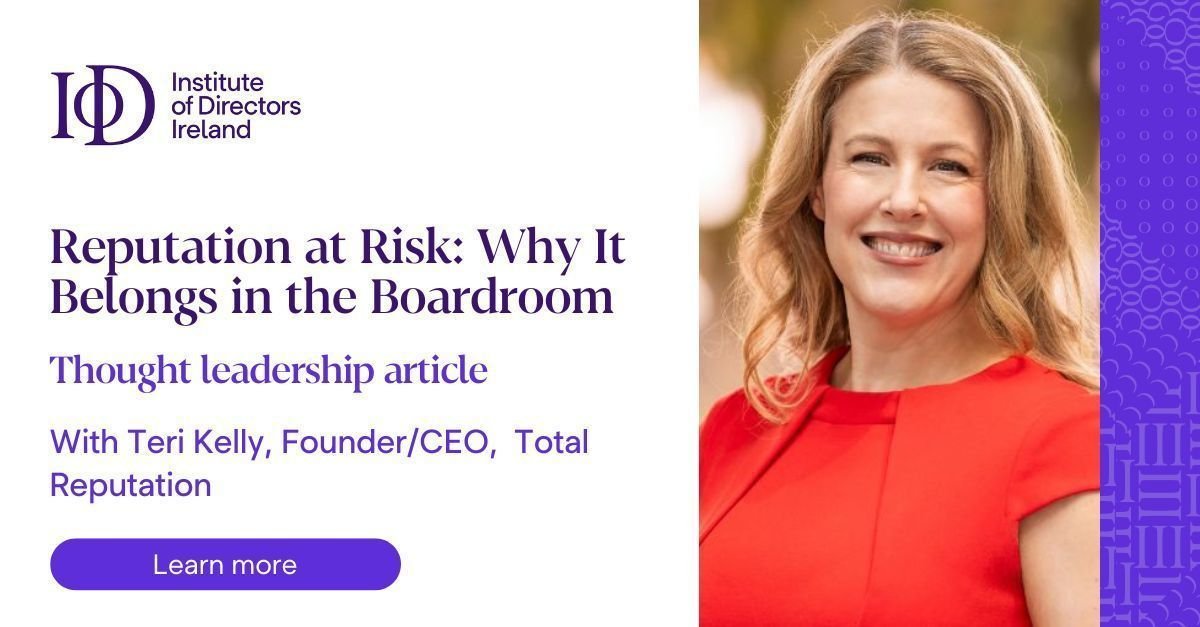Reputation at Risk: Why It Belongs in the Boardroom
In this thought leadership article, originally published by the Institute of Directors Ireland, Teri Kelly, founder/CEO, Total Reputation, discusses how reputation is now one of the top risks concerning companies and how this can be dealt with at the board table.
When RTÉ's reputation plummeted from 67th to 99th place in the Ireland RepTrak Index, it crystallised a reality Irish business leaders can no longer ignore. Reputation is not a communications afterthought but a quantifiable strategic asset requiring board-level governance.
Reputation is not a soft, intangible concept sitting on the edge of boardroom agendas. In 2025, it is a measurable, manageable, and mission-critical business asset. From ESG controversies to cybersecurity breaches, the stakes are high. Consider the current state of geopolitics, and pace of technological change, and the situation has taken on a new level of risk. The question is: are boards treating reputation with the same rigour as financial, legal or operational risks?
There is growing evidence that they should. According to Weber Shandwick, executives estimate that more than 63% of their company's market value is attributable to their overall reputation. Yet, a WTW (Willis Towers Watson) 2023 survey found that only 13% of companies rate their organisational resilience to reputational threats as "very good", down from 23% in 2021.
Why Reputation Now Ranks as a Top Risk
Aon's 2023 Global Risk Management Survey ranked damage to brand and reputation as the 8th highest risk globally. While every other global risk, from data breach to business interruption, has a clear reputation element.
Cyberattacks and environmental issues are at the top of executive concerns. The WTW 2024/2025 Reputational Risk Readiness Survey reported that 65% of executives identify cyberattacks and 64% identify environmental concerns as the top reputational threats to their organisations (up from 52% each in 2023). Governance risks were also up at 56% from 52% in 2023, as regulations continue to increase worldwide.
In Ireland, the risks are pronounced. The Hiscox Cyber Readiness Report shows that Irish businesses suffer an average of 58 cyberattacks annually, that’s more than one per week.
The rise of AI-generated content and deepfakes further complicates the landscape. In 2024, a deepfake video conference scam cost Arup $25 million in fraudulent payments by digitally cloning the engineering firm’s CFO. The potential for emerging technologies to trigger unprecedented reputational and financial harm is immense.
The Irish Context: Unique Vulnerabilities and Lessons
RTÉ’s sharp fall in the RepTrak rankings, the most significant decline in the study's 15-year history, illustrates how governance failures can escalate into national scandals with long-term brand impacts.
These cases reveal patterns that should concern every Irish board: inadequate governance structures, insufficient crisis preparedness, and the amplification effects of Ireland's interconnected media and business environment.
Why This Belongs at Board Level
The implications for directors are clear: reputation is now an enterprise-wide concern. Yet too often, oversight is fragmented or delegated to siloed operations, marketing, communications and PR functions.
Without systematic oversight and robust reputation crisis communications preparedness, organisations remain vulnerable. WTW noted that while reputational risk is a top concern, few organisations demonstrate high maturity in governance or readiness frameworks to manage it effectively.
From Reputation Vulnerability to Strategic Discipline: Total Reputation Audit
At Total Reputation, we have developed an audit framework that helps us identify our clients’ reputation vulnerabilities and opportunities to create reputation value. Often, we find siloed teams, weak alignment between communications and business strategy, and absent or wanting communications governance protocols. Reputation crisis preparedness is also lacking in all but the most prepared organisations. The result? Inconsistent messaging, missed opportunities, and greater vulnerability when a crisis hits.
Once we complete an audit for our clients, we can make evidence-based recommendations to refine communications strategy to protect and promote our clients’ reputations for resilience and value creation. It’s all about investing time and resource where it will have the greatest impact.
Reputational preparedness pays off. According to a 2024 analysis of Johnson & Johnson's handling of the 1982 Tylenol crisis, in which seven people died and an estimated $100 million in recall costs, the company restored its 37% market share within a year through transparent, safety-focused action enhancing its brand rather than damaging it.
Similarly, Domino’s Pizza undertook a multi-year transformation following a public backlash over product quality in 2009. By 2018, its stock had risen over 3,600%, making it one of the most dramatic reputation and business turnarounds in recent corporate history.
Four Questions Every Director Should Ask
Whether a national or multinational business, a membership body, a professional services firm, or a charity, reputation governance starts with the board.
Here are four key questions directors should be asking in 2025:
1. How well is our reputation and communications aligned with our values, operations and stakeholder expectations?
2. Do we have a clear, evidence-based view of our communications strategy and function beyond media reach or social engagement metrics?
3. Are we ready for a reputational crisis? Have we trained key people and tested the plan?
4. Do we integrate reputation impacts into major business decisions? Are the reputation experts, usually the Communications Director, at the executive table? Do we have reputation expertise on the Board?
The Strategic Payoff
Strategic investment in reputation does more than reduce risk, it drives growth. When managed effectively, reputation becomes a multiplier for trust, stakeholder loyalty, and resilience.
Reputation is no longer optional. In an age of regulatory scrutiny, polarised stakeholders, and real-time accountability, boards must treat reputation as a core business asset. Those who do will gain a critical edge. Those who don’t may find themselves managing decline rather than growth.
Teri Kelly is the Founder and CEO of Total Reputation, an evidence-based reputation management company specialising in audit, strategy and crisis preparedness. Learn more at http://www.totalreputation.ie. She is member of the Institute of Directors and serves on the National Council of the Public Relations Institute of Ireland and the Board of Active Disability Ireland.

